|
Listed by department. See
other faculty achievements in Top
Stories.
FACULTY
COUNCIL AWARDS
The annual Faculty Council Awards were given out
July 7. Here is the list of recipients:
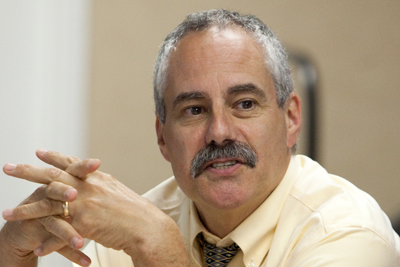 *Teaching/Senior:
Jon Appelbaum (pictured here), M.D., Clinical Sciences. *Teaching/Senior:
Jon Appelbaum (pictured here), M.D., Clinical Sciences.
*Teaching/Junior: Ewa A. Bienkiewicz, Ph.D., Biomedical
Sciences (pictured below).
*Research/Senior: Jamila I. Horabin, Ph.D., &
Branko Stefanovic, Ph.D., Biomedical Sciences.
*Research/Junior: Sanjay S. Kumar, Ph.D., Biomedical
Sciences.
*Guardian of the Mission: Helen Livingston,
Ed.D., Research, Undergraduate and Graduate Programs.
*Faculty Service:
Barbara Shearer, Medical Humanities (Library).
*Staff/Individual:
Cathy Bell, Academic Affairs.
*Staff/Group: Biomedical
Sciences staff.
BIOMEDICAL SCIENCES
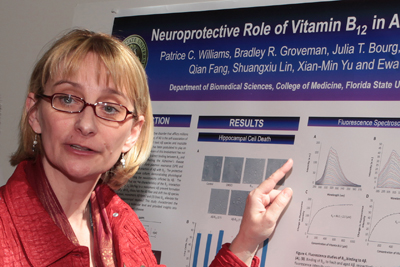 Ewa Bienkiewicz, Ph.D., has been awarded $25,000 for a
therapeutic agent that can go into the body and naturalize the effect of
toxic hemin release following a stroke (“A Novel Approach to Treating Stroke
Victims”). The GAP funding will help her take her current work much closer
to a point where it will have commercial opportunity. Ewa Bienkiewicz, Ph.D., has been awarded $25,000 for a
therapeutic agent that can go into the body and naturalize the effect of
toxic hemin release following a stroke (“A Novel Approach to Treating Stroke
Victims”). The GAP funding will help her take her current work much closer
to a point where it will have commercial opportunity.
James
Olcese, Ph.D., was elected this summer to be the next co-chair for
the FASEB (Federation of American Societies for Experimental Biology) Summer
Research Conference on Melatonin Receptors.
The Department
of Biomedical Sciences has
four new faculty members. Here are brief bios:
Michelle Arbeitman, associate professor, graduated summa cum laude
from the University of California at Berkeley. She received her Ph.D. in
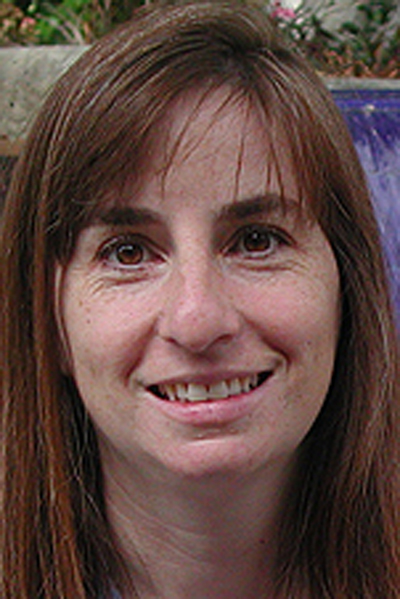 developmental biology from the Stanford University Medical School in 1998
and did postdoctoral studies in the Biological Sciences Department at
Stanford. Her first faculty position was at the University of Southern
California, where she held the Gabilan Assistant Professor Chair. developmental biology from the Stanford University Medical School in 1998
and did postdoctoral studies in the Biological Sciences Department at
Stanford. Her first faculty position was at the University of Southern
California, where she held the Gabilan Assistant Professor Chair.
Arbeitman’s research focuses on sexual development and behavior in the fruit
fly species Drosophila melanogaster. She and her colleagues were
some of the pioneers in using large-scale genomic approaches for the study
of animal development and behavior. At FSU she will continue to address one
of the frontier questions in biology: How are complex behaviors specified by
genes? This question asks how neural circuits that drive sex-specific
behaviors are specified and how genes and their products within these neural
circuits function to elaborate such behaviors. Understanding these questions
will someday have important implications for our understanding of human
neurological diseases and behaviors.
“This is a very exciting time to study the genetic basis of complex
behaviors,” said Arbeitman, who has received research awards from the National
Institutes of Health and National Science Foundation. “The repertoire of genomic, proteomic and
molecular-genetic tools that are available to biologists allows one to
investigate behavioral questions in an unprecedented manner. In the next
decade, we will have much greater insight into how genes specify behavior.
This will require an integrated cross-disciplinary approach, which is
greatly facilitated by the colleagues I have at FSU.”
Another new
faculty member is Associate Professor Eric D. Laywell. He
received his baccalaureate degree in psychology from the University of
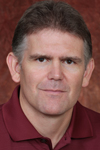 Michigan, performed his postgraduate studies in the Department of
Anatomy and Neurobiology at the University of Tennessee College of Medicine,
and received a doctorate in neuroscience. He received postdoctoral
training at the University of Utah and the University of Tennessee, and was
an assistant professor at the University of Florida before moving to FSU. Michigan, performed his postgraduate studies in the Department of
Anatomy and Neurobiology at the University of Tennessee College of Medicine,
and received a doctorate in neuroscience. He received postdoctoral
training at the University of Utah and the University of Tennessee, and was
an assistant professor at the University of Florida before moving to FSU.
Laywell’s broad research interest is the biology of astrocytes. He
initially studied astrocyte responses to CNS injury, but he is perhaps best
known for studies demonstrating that certain astrocytes have the cardinal
properties of neural stem cells. More recently, he has been investigating
novel therapeutic approaches for treating brain tumors. Laywell is the
author of
more than 40 papers and book chapters in his areas of expertise and is an
active grant reviewer for several organizations, including the State of New
Jersey, the State of New York and the National Institutes of Health.
In addition to his research activities, Laywell also enjoys teaching
gross anatomy and neuroscience to medical students. He received numerous
Exemplary Teacher awards at the University of Florida, and at FSU he
currently serves as the assistant course director for clinical human
anatomy, embryology and imaging.
Laywell also is
in the news: He has been awarded a 2011 Brain
Tumor Research Grant of $75,000 for his submission titled
“Improving Glioma Treatment with Adaptive Therapy.” Fifteen grants were
submitted from UF, FSU, Moffitt, M.D. Anderson, University of Miami, Scripps
and private practice. Five grants were selected by an independent panel of
reviewers who are renowned researchers from Johns Hopkins, Swedish Medical
Center, Duke and the University of North Carolina.
Also new to
the faculty is Pradeep G. Bhide, the inaugural holder of
the Jim and
Betty Ann Rodgers Eminent Scholar Chair of Developmental Neuroscience. He is
also the director of the Center for Brain Repair.
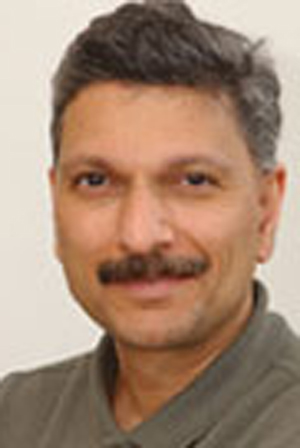 He received his
degree in veterinary medicine (B.V.Sc.) from Veterinary College, Bangalore,
India, and a Ph.D. in neuroscience from the University of Aberdeen,
Scotland. He undertook postdoctoral training in developmental neuroscience
at the University of Aberdeen, University College London, Yale University
School of Medicine, Massachusetts General Hospital and Harvard
Medical School. Following his postdoctoral training, Bhide rose to the
position of associate professor of neurology at Harvard Medical School and
director of research for neurology at Massachusetts General, where he was
also the program director for the Interdepartmental Neuroscience Center. He received his
degree in veterinary medicine (B.V.Sc.) from Veterinary College, Bangalore,
India, and a Ph.D. in neuroscience from the University of Aberdeen,
Scotland. He undertook postdoctoral training in developmental neuroscience
at the University of Aberdeen, University College London, Yale University
School of Medicine, Massachusetts General Hospital and Harvard
Medical School. Following his postdoctoral training, Bhide rose to the
position of associate professor of neurology at Harvard Medical School and
director of research for neurology at Massachusetts General, where he was
also the program director for the Interdepartmental Neuroscience Center.
Bhide’s research program in developmental neuroscience focuses on an
atypical role of the neurotransmitter dopamine – a role in regulating
neurogenesis and neuronal migration in the developing brain. His discoveries
in this field have led to a successful research program on the deleterious
effects of drugs such as cocaine on the developing brain. His
research program also focuses on the neurobiology of ADHD and development of
safe, abuse-free stimulant medications. Bhide has an active research program
on another developmental neurological disorder, early-onset torsion dystonia.
His research has been supported by the National Institutes of Health.
Finally, meet
Assistant Professor Jinmin Zhu, a longtime colleague of Bhide. Zhu received his M.D. degree
from the School of Medicine of Zhejiang University in Hangzhou, China, and a Ph.D. in neurobiology from Shanghai Medical College of Fudan
University. He worked at NIMH, NIH and Temple
University School of Medicine in Philadelphia as a postdoctoral fellow, then
was appointed instructor at Harvard Medical School and Mass. General
Hospital. He joined Medical Online Inc. in Lexington, Mass., in
1999. He received his M.S. in bioinformatics from Brandeis University the same year he was appointed a faculty member in the
Department of Radiology at Harvard Medical School and Brigham and Women’s
Hospital, Boston. He then transferred to the Neurology Department at MGH in
2009.
Zhu’s
research focuses on the structure and function of opioid receptors in the
developing and adult nervous system. He cloned the human and rodent opioid
receptors and determined the genetic structure for the receptor and
intracellular signaling mechanisms. Brain opioid receptors play important
roles in the regulation of the sensation of pain and also mediate addiction
and drug abuse. Zhu has studied the interactions between opioids and
catecholamines in the regulation of pain. In recent years, he has worked
on the role of opioid receptors in stimulant abuse, especially abuse of
methylphenidate, a commonly prescribed stimulant for the treatment of ADHD.
He believes that a better understanding of opioid receptor mechanisms in
stimulant abuse can help design a safer therapy for ADHD, which is estimated
to affect about 10 percent of children and 5 percent of adults worldwide.
FACULTY
DEVELOPMENT
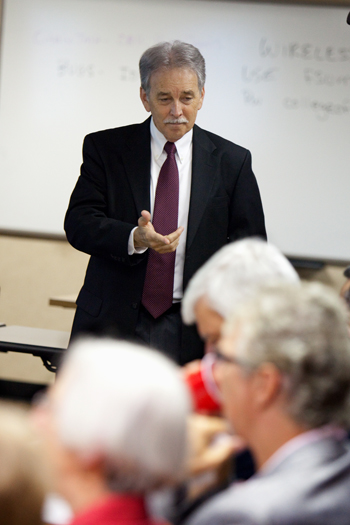 Dennis
Baker (pictured here), Ph.D., associate dean for faculty
development; Greg Turner, Ed.D., assistant dean for faculty
development; and Nancy Clark, director of medical
informatics education, presented in Toronto last May at the first International
Conference on Faculty Development in the Health Professions. Dennis
Baker (pictured here), Ph.D., associate dean for faculty
development; Greg Turner, Ed.D., assistant dean for faculty
development; and Nancy Clark, director of medical
informatics education, presented in Toronto last May at the first International
Conference on Faculty Development in the Health Professions.
Baker’s
presentation was “Contextual Enablers that Provide for a Robust Faculty
Development Program for Community-Based Preceptors in a Geographically
Distributed Campus Model.” Turner presented “Description of a Progressive
Developmental Faculty Development Program in a Community-Based Distributed
Campus Model.” And Clark’s presentation was “Delivering Faculty Development
in Medical Informatics to Community Based Clinical Faculty Located in Six
Cities Across Florida.” The conference had more than 300 participants
representing 28 countries. It was hosted by the medical colleges of the
University of Toronto and McGill University.
FAMILY
MEDICINE AND RURAL HEALTH
Gail Bellamy, Ph.D.,
director of the Center for Rural Health Research and Policy, and
Maggie Blackburn (pictured here), M.D., director of rural
health, participated several months ago in a summit meeting on rural health
care for six surrounding
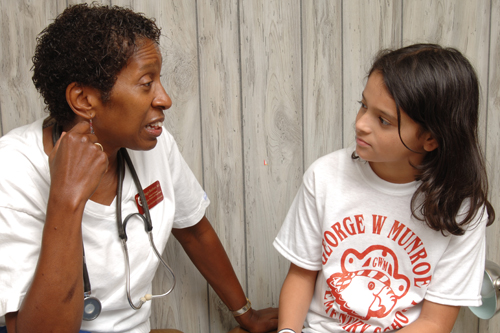 counties.
It was called the North Florida Rural Health Care Workforce Development
Leadership Summit, and more than 100 health-care professionals and community
leaders participated. The two faculty members are on the steering committee
of the workforce development network, which planned the summit. counties.
It was called the North Florida Rural Health Care Workforce Development
Leadership Summit, and more than 100 health-care professionals and community
leaders participated. The two faculty members are on the steering committee
of the workforce development network, which planned the summit.
“We decided to
do the summit in order to bring together the leadership of the six-county
area to address the health care workforce needs, both of the present and the
future, and to really help problem-solve … to keep our communities healthy
and moving forward,” Blackburn said. The six counties are Hamilton,
Jefferson, Lafayette, Madison, Suwannee and Taylor.
In addition to
the College of Medicine and the workforce development network, the summit
was sponsored by North Florida Community College, Doctor’s Memorial
Hospital, Madison County Memorial Hospital, Florida Area Health Education
Centers (AHEC) and North Florida Medical Centers Inc.
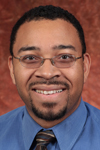 Kendall
Campbell, M.D., is the department’s newest faculty member. He was a
graduate of Florida A&M University and of Florida State’s Program in Medical
Sciences (Class of 1997), predecessor of the College of Medicine. He
got his M.D. at the University of Florida and completed training at the TMH
Family Medicine Residency Program. Kendall
Campbell, M.D., is the department’s newest faculty member. He was a
graduate of Florida A&M University and of Florida State’s Program in Medical
Sciences (Class of 1997), predecessor of the College of Medicine. He
got his M.D. at the University of Florida and completed training at the TMH
Family Medicine Residency Program.
For six years
he served on the faculty at the UF College of Medicine, where he also was
assistant dean of minority affairs and medical director and chief of one of
its clinics for underserved populations. He has a long history of mentoring,
educating and encouraging youth and young adults, serving as a motivational
speaker and advisor.
“Kendall brings
to the College of Medicine a heart for teaching,” said Dan Van Durme,
M.D.,
department chair, “and the goal of encouraging students to appreciate the
fulfillment and challenges of caring for the underserved.”
Suzanne Harrison,
M.D., has been elected to a two-year term on the board of directors of the
American Medical Women’s Association.
GERIATRICS
Alice Pomidor, M.D., participated in a roundtable
discussion of transportation and Florida’s rapidly growing aging population,
hosted by Ford Motor Co. Also participating were representatives of the
state Departments of Transportation, Elder Affairs, and Children & Families,
as well as AARP, the Alzheimer’s Project and more.
As of August,
Pomidor – formerly an associate professor – became a
professor of geriatrics.
A former
Florida State nutrition student, whose Ph.D. advisor was Ken
Brummel-Smith, M.D., is co-author of a paper in the
July-September edition of Topics in Clinical Nutrition. Delores
Truesdell co-wrote “Unintended Weight Loss and non-Hodgkin Lymphoma in a
Frail, Elderly Patient.”
MEDICINE AND LAW
Marshall Kapp, J.D., M.P.H., presented “Humanizing the
Legal Risk Management Education of Medical Students” June 30 at the 34th
Annual Health Law Professors Conference sponsored by the American Society of
Law, Medicine & Ethics.
In May, Kapp presented the
keynote address “Let There Be Law: Empowering Aging Families” at the Spring
Conference of the Massachusetts Gerontology Association, at Brandeis
University.
|




 *Teaching/Senior:
Jon Appelbaum (pictured here), M.D., Clinical Sciences.
*Teaching/Senior:
Jon Appelbaum (pictured here), M.D., Clinical Sciences. Ewa Bienkiewicz, Ph.D., has been awarded $25,000 for a
therapeutic agent that can go into the body and naturalize the effect of
toxic hemin release following a stroke (“A Novel Approach to Treating Stroke
Victims”). The GAP funding will help her take her current work much closer
to a point where it will have commercial opportunity.
Ewa Bienkiewicz, Ph.D., has been awarded $25,000 for a
therapeutic agent that can go into the body and naturalize the effect of
toxic hemin release following a stroke (“A Novel Approach to Treating Stroke
Victims”). The GAP funding will help her take her current work much closer
to a point where it will have commercial opportunity. developmental biology from the Stanford University Medical School in 1998
and did postdoctoral studies in the Biological Sciences Department at
Stanford. Her first faculty position was at the University of Southern
California, where she held the Gabilan Assistant Professor Chair.
developmental biology from the Stanford University Medical School in 1998
and did postdoctoral studies in the Biological Sciences Department at
Stanford. Her first faculty position was at the University of Southern
California, where she held the Gabilan Assistant Professor Chair. Michigan, performed his postgraduate studies in the Department of
Anatomy and Neurobiology at the University of Tennessee College of Medicine,
and received a doctorate in neuroscience. He received postdoctoral
training at the University of Utah and the University of Tennessee, and was
an assistant professor at the University of Florida before moving to FSU.
Michigan, performed his postgraduate studies in the Department of
Anatomy and Neurobiology at the University of Tennessee College of Medicine,
and received a doctorate in neuroscience. He received postdoctoral
training at the University of Utah and the University of Tennessee, and was
an assistant professor at the University of Florida before moving to FSU.
 He received his
degree in veterinary medicine (B.V.Sc.) from Veterinary College, Bangalore,
India, and a Ph.D. in neuroscience from the University of Aberdeen,
Scotland. He undertook postdoctoral training in developmental neuroscience
at the University of Aberdeen, University College London, Yale University
School of Medicine, Massachusetts General Hospital and Harvard
Medical School. Following his postdoctoral training, Bhide rose to the
position of associate professor of neurology at Harvard Medical School and
director of research for neurology at Massachusetts General, where he was
also the program director for the Interdepartmental Neuroscience Center.
He received his
degree in veterinary medicine (B.V.Sc.) from Veterinary College, Bangalore,
India, and a Ph.D. in neuroscience from the University of Aberdeen,
Scotland. He undertook postdoctoral training in developmental neuroscience
at the University of Aberdeen, University College London, Yale University
School of Medicine, Massachusetts General Hospital and Harvard
Medical School. Following his postdoctoral training, Bhide rose to the
position of associate professor of neurology at Harvard Medical School and
director of research for neurology at Massachusetts General, where he was
also the program director for the Interdepartmental Neuroscience Center. Dennis
Baker (pictured here), Ph.D., associate dean for faculty
development; Greg Turner, Ed.D., assistant dean for faculty
development; and Nancy Clark, director of medical
informatics education, presented in Toronto last May at the first International
Conference on Faculty Development in the Health Professions.
Dennis
Baker (pictured here), Ph.D., associate dean for faculty
development; Greg Turner, Ed.D., assistant dean for faculty
development; and Nancy Clark, director of medical
informatics education, presented in Toronto last May at the first International
Conference on Faculty Development in the Health Professions.  Kendall
Campbell, M.D., is the department’s newest faculty member. He was a
graduate of Florida A&M University and of Florida State’s Program in Medical
Sciences (Class of 1997), predecessor of the College of Medicine. He
got his M.D. at the University of Florida and completed training at the TMH
Family Medicine Residency Program.
Kendall
Campbell, M.D., is the department’s newest faculty member. He was a
graduate of Florida A&M University and of Florida State’s Program in Medical
Sciences (Class of 1997), predecessor of the College of Medicine. He
got his M.D. at the University of Florida and completed training at the TMH
Family Medicine Residency Program. 